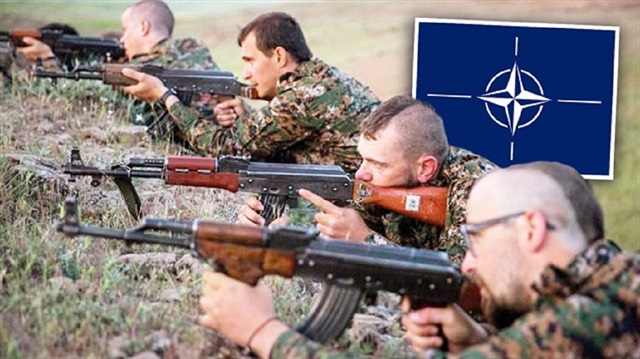
The US and NATO occupied Syria's northern border under the pretext of fighting Daesh in order to form a new Middle East map
NATO countries, led by the U.S., backed terrorist organizations in and around Turkey in order to implement new maps. The U.S.-NATO alliance, which initiated the Middle East map change with the invasion of Iraq in 1991, supported terror groups such as the Kurdistan Workers' Party (PKK) both directly and indirectly. Turkey’s so-called allies provided terror groups including Daesh, PKK and the Revolutionary People's Liberation Party/Front (DHKP-C) with arms and ammunition as well as logistic and militant support. A significant number of Western terrorists who fought under the guise of "volunteering" in Iraq and Syria consisted of those who fought with the NATO mission in Afghanistan and Iraq.
There are still over 5,000 foreign fighters from the U.S. and Europe in the ranks of the PKK/PYD. The PKK even organized an “International Battalion” for the terrorists from NATO member states. Most of the terrorists registered in the PKK battalion in Kobani’s headquarters are members of NATO in Afghanistan, Iraq and Libya. The PKK/PYD is conducting ethnic cleansing with the pretext of fighting against Daesh.
The PKK is listed as a terrorist organization by Turkey, the European Union and the United States. The PKK has been conducting armed violence in the southeastern part of Turkey since 1984. More than 40,000 people, mostly civilians, have been killed in the three-decade long conflict.
Similarly to the PKK, a significant portion of Daesh is also comprised of Western terrorists. Between 2014 and 2016, over 15,000 foreigners from Germany, France, Britain and other European countries joined Daesh. The number of foreign fighters/intelligence workers in Daesh caused so much concern that last year, NATO's former Secretary General Anders Fogh Rasmussen admitted that foreign fighters who joined Daesh were “best killed away from home” as “the best option for Europe.”

Terrorist organizations operating in the Middle East, especially the PKK, have been armed for 30 years by the U.S. and NATO countries. The U.S., which has given weapons to the PKK since 1993 in Iraq, first gave the terrorist group the M-16 infantry rifle. Sniper rifles, rocket launchers and mortar rounds followed the M-16. The nature of this support evolved into high-tech weapons with the declaration of the U.S.-PKK alliance throughout the Syrian civil war. After 2014, the PKK obtained anti-tank weapons like the AT-4 as well as armored vehicles, night vision binoculars and modern camouflage.
Daesh also received similar support, and evidence of this is that 70 percent of weapons seized from Daesh are weapons of NATO origin. Following the alleged occupation of Kobani by Daesh, U.S. weapons that were sent to both the PKK and Daesh led to the suspicion that the U.S. and some European countries were supporting both organizations simultaneously. The presence of tons of weapons and ammunition belonging to NATO in Daesh armories in cities like Raqqa, Tel Afar and Deir ez-Zor was concrete proof of this. The U.S. and NATO occupied Syria's northern border under the pretext of fighting Daesh in order to implement a new Middle East map.

Western associations and foundations operating on the border under the guise of alleged aid activity in Syria and Iraq cause various security risks in the region. Many of these institutions specialize in issues such as border trafficking, logistical support to terrorist organizations, militant transfer, and arms and money transfers, and many of these organizations are run by former soldiers. These minor institutions under the leadership of Western retired generals fund the PKK/PYD. Most of the “suspicious” foundations based in the U.S., France, Germany, England, Norway, the Netherlands, Denmark, Belgium and Italy were closed after accelerated inspections following the July 15 coup attempt in Turkey.
Among the organizations that manage billions of dollars and are allegedly closely linked to intelligence agencies are the Mercy Corps, Chemonics International, Catholic Relief Services, Danish Refuge Council, World Vision, International Rescue Committee, Norwegian Refugee Council, People In Need, Irish Aid, Goal Humanity, Integrity Global, Center for Civil Society and Democracy and the Eastern Mediterranean Institute.

Major Andrea Clair and Major Anthony Eliss, who are senior executives in these so-called civil society organizations, are two names who served in NATO’s Afghanistan operations. Both of these figures are still active at Integrity Global. Retired Colonel Allen Kirk, who also served under NATO in Iraq and Argentina, is a senior executive at the Center for Civil Society and Democracy. According to the information provided to Yeni Şafak by sources who have undertaken subcontracting tasks, almost all of the former soldiers of the institution use pseudonyms. It is almost impossible to reach the real names of those who are using false identities.


